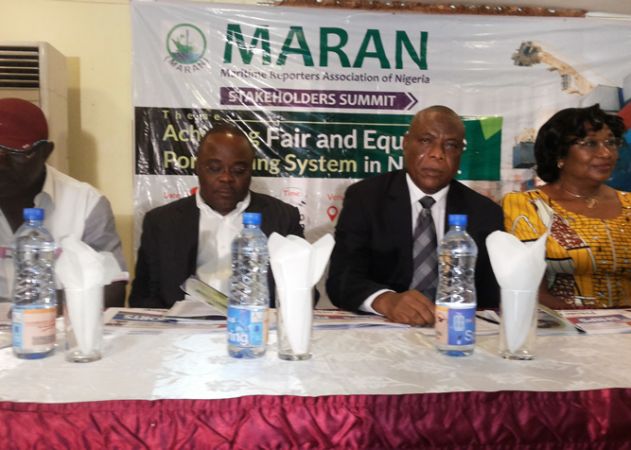The Maritime Reporters’ Association of Nigeria (MARAN) has called on the Federal Government to extend the executive approval granted the Nigerian Shippers’ Council to operate as the Ports Economic regulator from one year to five years.
The President of the Association, Mr. Bolaji Akinola who made this call while presenting his welcome address at a one day seminar tagged, “Achieving Fair and Equitable Port Pricing System in Nigeria”, jointly organized by the association and the Nigerian shipper’s Council in Lagos on Monday, stated that the one year approval granted the council by the federal Government was not enough to carry out the tasks that the council was saddled with.
Akinola further called on the federal Government to as a matter of urgency ensure that the Ports and Harbours Bill before the National Assembly is passed this year as according to him, the passage of the bill would give the NSC the necessary backing to do its job.
According to him,” the one year approval granted it by the federal government is certainly not enough to carry out the daunting tasks the NSC has been saddled with”.
“It has therefore become imperative that the executive approval be extended to five years while the exigencies of politics should not close the eyes of the federal government to the need to urgently get the Ports and Harbours bill passed this year. The passage of this bill which has provision for a Port regulator will give the NSC the necessary statutory backing to do its job”.
The MARAN President observed that the appointment of the NSC had been received with applause by the Maritime industry adding that the confidence of stakeholders has therefore placed a burden on the council to be independent and fair to all players in the industry.
He pointed that without being independent in dealing with all the actors in the industry, NSC may not creditably commit to its key tasks of protecting rights and containing opportunistic behaviour by users of the ports services or by providers of such services even as he called for independence of the Council from the government.
Akinola who is also the Managing Director of the Ships and Ports Communications Company therefore called for an effective capacity building of the Council’s staff to enable them gain a deep insight and understanding of the port system so as not to be swayed by what he called noise in the market place which according to him may be a deliberate ploy to obliterate the truth or divert attention.
On his part, the Executive Secretary, Nigerian shippers’ Council, Barr. Hassan Bello pledged to stem the tide of capital flight taking its toll on the maritime industry in Nigeria.
Bello who was represented at the event by the Chief Operating Officer, Compliance and Monitoring Unit of the Council, Mrs. Catherine Ifeora further promised to ensure a sustainable port pricing system that would boast port operations in Nigeria.
He stated that the port plays a very crucial part in the economy of any nation that it must be provided with the necessary attention it required to get easy exit of goods.
The Shippers’ Council boss noted that a right pricing mechanism would promote growth and prosperity in the ports.
He said,” wrong pricing can guide port to inefficiency or even extinction, also a high pricing could deprive a port of high patronage of vessels and cargoes. Wrong prices will reduce demand for cargo services and when the demand for port services is reduced, equipment at the ports will be underutilized|”.
“Even with monopoly, high port prices will hurt persons the port is supposed to serve. Low ports prices, on the other hand, could bring life into a port but congestion may be the order of the day”.
Also speaking, the President, Shippers’ Association of Lagos State, Rev. Jonathan Nicol observed that inequitable port pricing system in Nigeria, although belated, was a welcome development in the “New Port Order” that was emerging in the country.
While advising that the foreign exchange transaction in Nigeria be dealt with strictly by the banks, Nicol however called for the abolition of the black market system seeks to encourage currency trafficking in Nigeria.
“Besides, Shipping and Terminal Companies use the current black market exchange rates to increase their charges, according to them, they buy equipment and source for funds through the black market without recourse to the Nigerian shippers’ Council. This is inequitable”, he said.
The Shippers’ Association boss pointed out that there were hidden charges in the transaction contract document called the bill of lading adding that in that document, there were charges as handling fees, packaging fees amongst others which ought to be done away with.
While noting that the freight charges varies from one shipping companies to the other, he stated that there was the need to streamline them with all the existing shipping companies operating in Nigeria.
Nicol further disclosed that one of the routes where unrealistic pricing exist was the collection of the unlawful levies by some officers of the Nigeria Customs Service.
He however noted that while the Nigeria Customs Service receives 7 percent of the total revenue on customs duties collected as incentives and 1 percent PAAR levy, it was on record that between January and November 2013, over 28 billion Naira was collected by 5 service providers.
“So, the Nigeria Customs Service is richer than some African Countries yet we have the following in their system during the process of clearing cargo; general purse, endorsement fee, Customs examination fee, CIU fee, enforcement fee etc.”.
“These are invisible transactions and are not receipted for. It is believed that about one third of the total revenue for the government is assumed to have entered into private pockets. The Nigerian government should be blamed for this. In order to get equitable port pricing, all these illegal tolls in the Nigeria Customs formations must be dismantled”, Nicol counseled.

